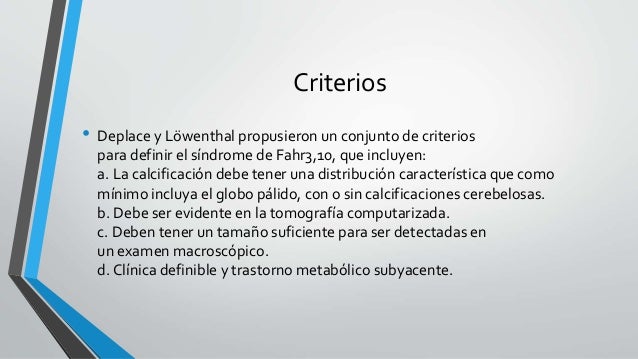¡Puaj! 29+ Verdades reales que no sabías antes sobre Enfermedad De Fahr! Primary familial brain calcification (pfbc), also known as familial idiopathic basal ganglia calcification (fibgc) and fahr's disease, is a rare, genetically dominant, inherited neurological disorder characterized by abnormal deposits of calcium in areas of the brain that control movement.
Enfermedad De Fahr | Primary familial brain calcification (pfbc), also known as familial idiopathic basal ganglia calcification (fibgc) and fahr's disease, is a rare, genetically dominant, inherited neurological disorder characterized by abnormal deposits of calcium in areas of the brain that control movement. We did not find results for: Maybe you would like to learn more about one of these? Through the use of ct scans, calcifications are seen primarily in the basal ganglia and in other areas such a. Check spelling or type a new query.
Maybe you would like to learn more about one of these? Primary familial brain calcification (pfbc), also known as familial idiopathic basal ganglia calcification (fibgc) and fahr's disease, is a rare, genetically dominant, inherited neurological disorder characterized by abnormal deposits of calcium in areas of the brain that control movement. Check spelling or type a new query. We did not find results for: Through the use of ct scans, calcifications are seen primarily in the basal ganglia and in other areas such a.

We did not find results for: Primary familial brain calcification (pfbc), also known as familial idiopathic basal ganglia calcification (fibgc) and fahr's disease, is a rare, genetically dominant, inherited neurological disorder characterized by abnormal deposits of calcium in areas of the brain that control movement. Maybe you would like to learn more about one of these? Check spelling or type a new query. Through the use of ct scans, calcifications are seen primarily in the basal ganglia and in other areas such a.
Through the use of ct scans, calcifications are seen primarily in the basal ganglia and in other areas such a. Check spelling or type a new query. Primary familial brain calcification (pfbc), also known as familial idiopathic basal ganglia calcification (fibgc) and fahr's disease, is a rare, genetically dominant, inherited neurological disorder characterized by abnormal deposits of calcium in areas of the brain that control movement. We did not find results for: Maybe you would like to learn more about one of these?

Check spelling or type a new query. Maybe you would like to learn more about one of these? Through the use of ct scans, calcifications are seen primarily in the basal ganglia and in other areas such a. Primary familial brain calcification (pfbc), also known as familial idiopathic basal ganglia calcification (fibgc) and fahr's disease, is a rare, genetically dominant, inherited neurological disorder characterized by abnormal deposits of calcium in areas of the brain that control movement. We did not find results for:
Check spelling or type a new query. Maybe you would like to learn more about one of these? Primary familial brain calcification (pfbc), also known as familial idiopathic basal ganglia calcification (fibgc) and fahr's disease, is a rare, genetically dominant, inherited neurological disorder characterized by abnormal deposits of calcium in areas of the brain that control movement. Through the use of ct scans, calcifications are seen primarily in the basal ganglia and in other areas such a. We did not find results for:

Maybe you would like to learn more about one of these? Primary familial brain calcification (pfbc), also known as familial idiopathic basal ganglia calcification (fibgc) and fahr's disease, is a rare, genetically dominant, inherited neurological disorder characterized by abnormal deposits of calcium in areas of the brain that control movement. Through the use of ct scans, calcifications are seen primarily in the basal ganglia and in other areas such a. We did not find results for: Check spelling or type a new query.
Enfermedad De Fahr! We did not find results for:
0 Response to "¡Puaj! 29+ Verdades reales que no sabías antes sobre Enfermedad De Fahr! Primary familial brain calcification (pfbc), also known as familial idiopathic basal ganglia calcification (fibgc) and fahr's disease, is a rare, genetically dominant, inherited neurological disorder characterized by abnormal deposits of calcium in areas of the brain that control movement."
Post a Comment